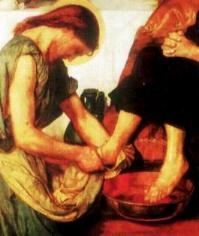
How many times have we stood in tears before our abuser, unable to understand what he or she is doing to us? Suddenly glimpsing a world gone mad. A world of shoes, stolen and thrown away, of soles and heels, the souls being damaged, bruised, rather than healed, kicked, rather than loved.
In a sense, Oliveleaf, as a Website, is a cobbler's shop.
Abuse is Power.
Love is Humility .

I am your sister. You are my brother. Wherever I
have hurt your soul, please tell me. And where you have hurt
mine, please heal it. Let us mend each others' soles, heal
each others' souls, and so our own.
I tend to wear my shoes until they are in holes, letting in the rain water. Once, in Dallas, I broke down, went in to buy new shoes, said to the salesman how I hated doing so, for new shoes hurt, while old ones are so comfortable. I was feeling ashamed, both because my shoes were so shabby, and because the salesman is black, remembering shoeshine stands and all the ignominy and humiliation of drinking from water stands labeled for whites, for blacks. 'Yes', he replied, 'It's like that with a Bible. When it gets too old and tattered and one knows one's way around it perfectly, it's time for a new one.' And smiled in his memory of the joy and worth those pages give in the reading.
It was like that moment in Princeton University
Library with its two sets of doors, and a black man opened the
first for me, and I opened the second for him, and we both
laughed, recognizing we had broken the system against us!
Indeed blacks were professors there first, then women. How
splendid it is to love God with all one's heart, soul, mind
and strength, and one's neighbour as oneself.
All the forms of trauma, death-threatening violence, from war, from terrorism, from natural disaster, or sexual abuse, rape, abortion, especially in families, or from clergy, or from other 'carers', or exile, or imprisonment, or other rejection, whether for race, religion, language, age, sex, all this damages souls, minds, bodies, hurting them, needing their healing.
For your soul healing these are blessed oliveleaves:
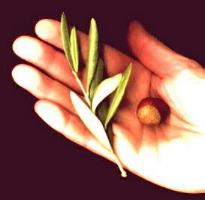
They are given to you with all the admission of the extent of such soul damage, its Gethsemani time on the Mount of Olives, and also with all the healing for the nations of the leaves of the trees by Jerusalem waters in Ezekiel and in Revelation. In the Bible are these passages:
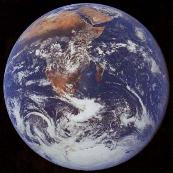
Then the angel showed me the river of the water of life, bright as crystal, flowing from the throne of God and of the Lamb through the middle of the street of the city. On either side of the river is the tree of life, with its twelve kinds of fruit, producing its fruit every month; and the leaves of the tree are for the healing of the nations. Revelation 22.1-2

Mosaic of God's Lamb, the Tree and the Water of Life
Yesterday - but that was a yesterday now three years ago, now twelve years ago - when I first wrote those words, beginning this website - was the day of rotten apples. Baskets of them in different stages of decomposition. But my landlord, who knew real hunger in wartime, insists that nothing be wasted. So I took all the bruised rotting windfalls found on our mountain and carefully cut away the rot from the good, and mixed the good with chopped walnuts, cinnamon and yoghurt. The rotten parts, compost for the garden. My contemplation was on Judgement Day, Julian style. She says that there is a secret, and that each having God's word in them shall be saved. And I thought that each of us, no matter how rotten to others, or bruised by others, has part of that good sweetness still left in us, the image of God, and that that part, even if it gets to be a smaller and smaller fraction, shall redeem the whole. What could one call that part? Perhaps God's mercy. What I could redeem was a half of the whole. And a fraction of each and every apple. So none were totally damned. Reminds me too of the collection of books the Archdeacon had me bring to Holmhurst St Mary from another convent, of St Elizabeth of Hungary (we used to call them the 'Hungry Sisters'), and that I found in one book, used as a bookmark, one very dried old apple core! And I laughed!
Terrible things kept happening to this essay. It kept accidentally, on purpose, like my friend's sister's shoes, being thrown away, out into the street, into the waste basket. Then retrieved, but the wrong and earlier versions. It became confused with soulcity.html, the essay on Julian of Norwich and Margery Kempe. And this was teaching me never to throw away any person, not a Margery Kempe, not a Mary Heap, about whom we learn from Christopher Abbott, not a shopping bag lady at the altar rails in Westminster Cathedral, not the black lady who every morning used to light the first candle in All Saints Anglican church in Margaret Street, from which the priest would then light the candles on the altar for Communion, not the gypsy child almost stealing my month's pension. All are infinitely precious, bringing God into our lives.
When I asked the All Saints' priest where she is
now, he said 'She is gone,' and he preaches about this as not
the church for families, for women, for children, on Holy
Family Sunday, but for single gays. A married Anglican bishop
agreed with him, when I protested. 'That is where there is
money', he told me, 'not in families'. But in Judaism it is
the lay mother, like Mary, who begins the Sabbath with blessing and lighting
the Sabbath lights, then
the lay father, like Joseph, and later Jesus, with the
blessing of the bread and wine, then the child, like David,
like Jesus asking the Passover question, 'Why is this night
special above all nights?'. We need this ingathering of all,
children, women, men, the aged, none refused.
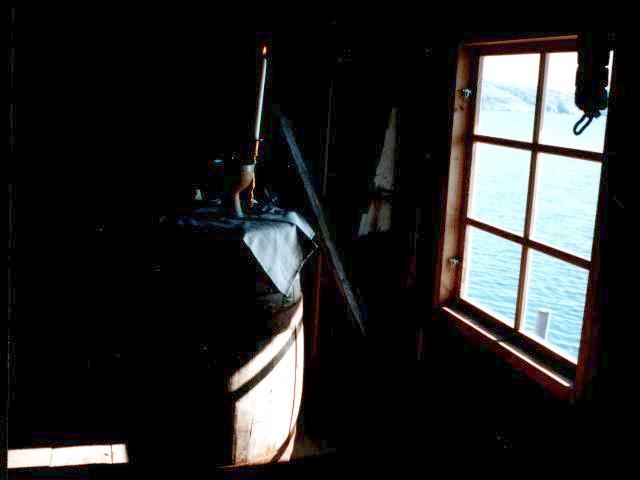
Catharina's Boathouse Mass on her island in Sweden
And the gypsy girl? I met her and she changed my life. I was coming from the bank with my month's small pension, angered about Anglican bishops stealing millions of pounds sterling from women and children, preoccupied, when suddenly I realized there was a child in front of me, her hand in my bag. In my alarm I cried out in English, not Italian, 'That was bad!' Then realized, to my relief, I had not spoken against her, but the sin, nor had she yet stolen the needed money. Now I wish I had shared it with her. But I found myself looking intensely into her eyes, and she into mine, and suddenly realizing, in an Epiphany, that this was my sister, that I was meeting Christ's sister. And that what she was taking was infinitely less than millions of pounds sterling robbed by respectable men of the cloth, in the House of Lords, and all my life's earnings, from me. The Gospels' world upside down. Or the right way round. The next week the Church canonized a gypsy saint in St Peter's great oval Square.
I came home and wrote of this on the Internet, on the Thomas Merton Discussion List, and Chesko wrote back, thanking me for my kindness to his sister, explaining she would be beaten if she had returned without money to her family that night, that he, too, is gypsy, coming from China at twenty to be a Trappist monk. And I thought of the gypsy legend of the stealing of the nails from the cross by gypsies, and their being forgiven by Christ because they relieved His pain. Each day that I would go up to receive Christ, passing the Crucifix with its huge nails, that sometimes fall to the floor with a clatter and have to be replaced by a brother of the Comunita`, I would think of that legend and wish myself to be such a gypsy stealing such nails from Christ's feet and hands, freeing them to free and bless the world.
Ever since I carry change in my bag and give it to gypsy beggars, mothers with their babies, and am surrounded by the sound of their voices saying 'Grazie ', with such love, that that most beautiful word fills my day with the grace of God. They bless me. And are a blessing.
We, who are the bruised apples, need to empower each other to forgive the rotten ones. We can't accept being told by rotten ones they must be forgiven by us while they continue to abuse us. Apples, through the winter, are stored on attic floors, not one touching the other, lest the rot spread through the whole. We need to say we must separate ourselves from rot. And that there is God's mercy for all. We can love the sinner, not the sin. And that love, that mercy, can heal that sinner. Who mirror-reflects us - and God.
Thinking on humility, recognizing the abuser
wrongfully uses power, the opposite of humility, breaking the
laws of nature and humanity, as if in an infernal miracle,
behaving like a god, shattering God and goodness and meaning
for the victim. And how forgiveness, as was said in Nicaragua,
is our best revenge. The perpetrator acts as if the centre of
the universe, 'I am become the destroyer of worlds'. Let us
respond, 'We are life. God creates us and all we have, and
therefore we are dearworthy'. The perpetrator, abusing power,
loves hierarchy and hiddenness, excluding others for self.
Julian replies with the sense of all others as our
'even-Christian', in the love of God and the love of
neighbour. The perpetrator desires all our reverence, all our
fear, but does not cherish God or those in God's image,
seeming to have no fear of God, nor to respect God's laws,
seeming to solely exist to gratify the self. Worst is when
such evil garbs itself as religion.
In Julian's Trinity , God the Father is Power, God the Son, Wisdom, God the Holy Spirit, Love. We need to give back to God, and to our neighbour in God's image, God's Power in humility. It is not ours. It is dangerous. In our hands it turns towards the Evil One. We need to give back to God, and also to our neighbour in God's image, God's Wisdom in humility. It so marvellously makes us, and our dissecting it, anatomizing it, unmakes Creation. But we can take and give forever God's Love in a glorious sharing, that gives us freely also of Power and Wisdom. Nothing is Wiser nor Stronger than God's Love. Or than God's Humility.
Power is Abuse.
Love is Humility .
God is especially Humility, born as a human child in
a stable among beasts from poverty. . . dying, like Abel, from
our cruelty, a death on a criminal gallows for slaves . . . in
his love, giving us that cross to
share, on our brow at baptism, to forgive us as was Cain
protected from vengeance by God. We are Cain and Abel, Adam
and Christ.
Which is best? Power and terror? Or humility and joy. A nuclear bomb? Or a hazelnut held in the palm of one's hand - that is all that is. Because the Empress Helena built the Basilica of Bethlehem with a lowly door, horses could never enter to tear it down. It is as playful, joyous, lowly children we enter Heaven's Kingdom.

Use this as your space, in which to write what you
feel could heal souls, mend soles and heels. Send its message
to: holloway.julia@tiscali.it
- who can post it here.
See also http://www.umilta.net/19432010.html
UMILTA WEBSITE || OLIVELEAF WEBSITE || JULIAN OF NORWICH, TEXT AND CONTEXTS,
WEBSITE || BIRGITTA OF SWEDEN,
REVELATIONES, WEBSITE || CATALOGUE
AND
PORTFOLIO (HANDCRAFTS, BOOKS ) || BOOK
REVIEWS || BIBLIOGRAPHY ||
FLORIN WEBSITE ©1997-2024 JULIA
BOLTON HOLLOWAY
|
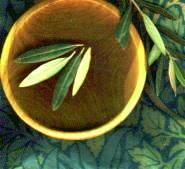 Oliveleaf
Website
Oliveleaf
Website
| To donate to the restoration by Roma of Florence's
formerly abandoned English Cemetery and to its Library
click on our Aureo Anello Associazione:'s
PayPal button: THANKYOU! |